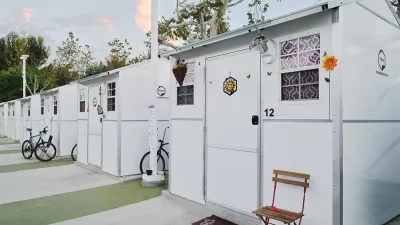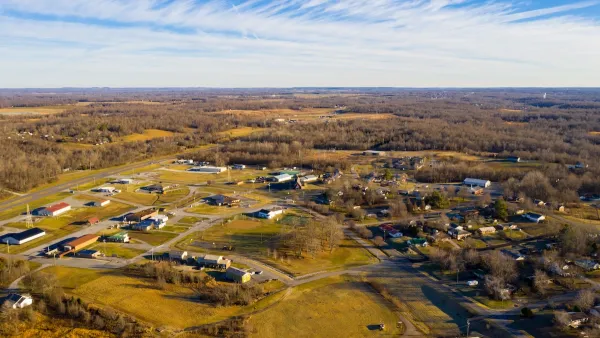Critics of the plan say the effort is a drop in the bucket in a state where tens of thousands of people experience homelessness every night.

“Governor Gavin Newsom announced on Thursday his administration will provide 1,200 tiny homes to cities and counties around California in an effort to shelter unhoused people in the state, which has the highest rate of homelessness in the nation,” according to an article by Chris Nichols and Nicole Nixon for Cap Radio.
The quick-build shelters are viewed as a cost-effective temporary housing solution and have been adopted by some cities as one way to reduce the number of encampments on public property and connect unhoused residents with resources. “The governor said the tiny homes will cost approximately $30 million and would be set up ‘within months, not years,’ estimating they could be open by this fall.” But the authors point out that some ‘tiny home village’ projects in the state have seen delays and cost overruns.
Critics of the plan say it’s only a band-aid for a much larger problem, stemming in part from a lack of clarity about the responsibilities of state and local agencies. “How can local governments address growing homeless camps on state property, such as along freeways, when it’s not their jurisdiction? How can a city provide mental health or addiction treatment services when only county governments are funded to do so?”
To help agencies at different levels coordinate their efforts, “On Thursday morning, the California Association of Counties, CSAC, unveiled its AT HOME plan with the goal of defining those roles for all levels of government.” The plan, which would require state approval to become law, calls on local and state agencies to collaborate on clear definitions of their roles and jurisdictions.
FULL STORY: Newsom administration to provide 1,200 tiny homes statewide, including 350 for the Sacramento region

Maui's Vacation Rental Debate Turns Ugly
Verbal attacks, misinformation campaigns and fistfights plague a high-stakes debate to convert thousands of vacation rentals into long-term housing.

Planetizen Federal Action Tracker
A weekly monitor of how Trump’s orders and actions are impacting planners and planning in America.

Chicago’s Ghost Rails
Just beneath the surface of the modern city lie the remnants of its expansive early 20th-century streetcar system.

Bend, Oregon Zoning Reforms Prioritize Small-Scale Housing
The city altered its zoning code to allow multi-family housing and eliminated parking mandates citywide.

Amtrak Cutting Jobs, Funding to High-Speed Rail
The agency plans to cut 10 percent of its workforce and has confirmed it will not fund new high-speed rail projects.

LA Denies Basic Services to Unhoused Residents
The city has repeatedly failed to respond to requests for trash pickup at encampment sites, and eliminated a program that provided mobile showers and toilets.
Urban Design for Planners 1: Software Tools
This six-course series explores essential urban design concepts using open source software and equips planners with the tools they need to participate fully in the urban design process.
Planning for Universal Design
Learn the tools for implementing Universal Design in planning regulations.
planning NEXT
Appalachian Highlands Housing Partners
Mpact (founded as Rail~Volution)
City of Camden Redevelopment Agency
City of Astoria
City of Portland
City of Laramie





























